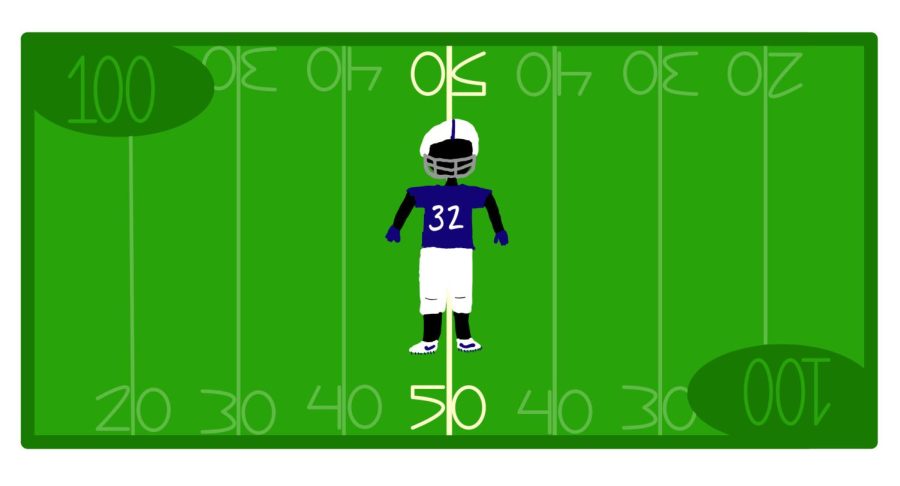Sponsorship-wreck
New ruling brings benefits, corruption to NCAA
On June 21, 2021, the United States Supreme Court unanimously ruled that the NCAA could no longer bar payments to student athletes. This was a decision that only added to the many existing challenges facing a college sports system that generates massive sums of money for schools, but does little to compensate the players responsible for making that money. Throughout its 116-year history, the NCAA has largely defended the idea that their student athletes should be treated as amateurs.
Before the Supreme Court ruling, even top athletes in high profile sports were limited to being compensated for their tuition, books, and rooming. Now that athletes are able to receive compensation for their play on the field, many fans of collegiate athletics will subsequently ask the question: does the payment of college athletes have a positive or negative effect on the integrity of the game?
“I think that collegiate athletes being able to finally receive compensation is great for the sport,” said junior Ryan Camblin. “It brings legitimacy to the games being played and rewards the players for their tireless efforts.”
Collegiate athletes rarely have days that aren’t totally revolved around their sport. According to a 2011 NCAA survey, most college athletes practice upwards of forty hours every week. This can be extremely taxing on an athlete who is working hard to balance athletic, student, and social lives. Spending all this time on one single goal, while being unrewarded for the work that is put in, can be very mentally draining for a college athlete.
“I don’t see any reason for college athletes to not receive compensation from sponsors,” said junior John Kaiser. “They put their bodies on the line every time they play, and make lots of money for the schools.”
In most universities, athletes are a big source of income to the institution.
According to a study done by the National Bureau of Economic Research, less than seven percent of money generated by the NCAA—more than 8 billion dollars annually—is put to scholarships and rooming for student athletes. This is a stunning disparity between the amount of money made, and money provided towards the players. In all American major-league sports, the players receive upwards of 50 percent of all profits made.
Most fans of collegiate athletics are strong supporters of NCAA athletes being compensated, but some have questioned how this system would work. Would athletes be receiving money from universities directly, or from the greater bodies, such as conferences? The NCAA seems to have found an acceptable system of their athletes receiving compensation, with companies being able to sponsor individual athletes, and pay them accordingly. This system has resulted in both positive and negative reactions from critics.
“To me [college athletes being compensated] is sort of a win-win,” said varsity track and field coach, and former college athlete Kirsten Nozime. “The athlete gets paid based on their own talents, personality and the universities don’t have to get tied up in the financial web of ‘salaries’ for athletes.”
The prospect of sponsors being able to pay college athletes is an intriguing one, as it proposes some interesting ethical questions. Could big-name companies offer high-school students enormous sums of money, simply to choose one college over the other?
“When it comes down to how much money the schools are making from [the athletes] it’s only fair in their regard to be able to make some money themselves,” said Mr. Eric Levin, history teacher, and head baseball coach at Vernon Hills High School. “From a recruiting standpoint, it will be interesting to see if there is going to be some polarization of the bigger schools getting bigger, or if this is a way to help the smaller schools have a better chance at winning.”
Just recently, in December of 2021, Travis Hunter, the number one high school football recruit in the country, was allegedly offered 1.5 million dollars by digital media company Barstool Sports. This offer came with a caveat, however. Hunter would only receive the money and the sponsorship deal upon enrolling at Jackson State University. This commitment, while unexpected, as Hunter was also fielding offers from national powerhouses such as Alabama and Georgia, is ultimately unsurprising. Money is enough to fix many problems, and it was evidently enough to choose where Hunter will play out his collegiate football career.
It should be clear that though it can and will likely be abused, allowing collegiate athletes to be compensated for their work is the right thing for the athletes, and those sponsoring them. Though the NCAA may cling to a reality that their athletes are amateurs, and therefore undeserving of compensation, this is something that has no place in college athletics today. Amateurism in college sports isn’t just over, it should be obvious by now that it was never part of what made college sports popular. The players, above all else, and their unique skill-sets and personalities are responsible for drawing eyes to screens.
Your donation will support the student journalists of Saint Viator High School. Your contribution will allow us to purchase equipment and cover our annual website hosting costs.








